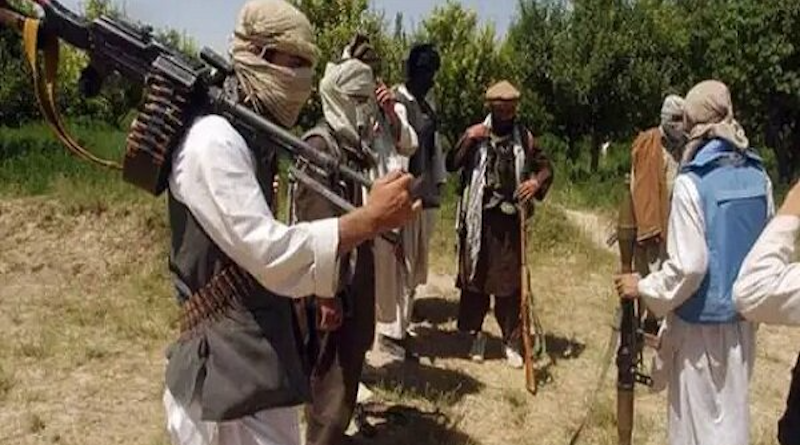Pakistan Losing Khyber Pakhtunkhwa: TTP Resurgence And The Taliban’s Revenge – Analysis

Members of Pakistan Taliban 'Tehreek-e-Taliban Pakistan' (TTP). Photo Credit: Tehran Times
Pakistan’s long history of supporting jihadist groups as strategic assets has come full circle. The country is gradually losing its Khyber Pakhtunkhwa province to terrorism.
The number of attacks on by the Tehrik-i-Taliban Pakistan (TTP) has more than tripled between 2021 and 2024, according to the Jihad and Terrorism Threat Monitor.
While Islamabad has sought to externalise blame, particularly towards Afghanistan and India, the reality is that TTP’s rise, fragmentation, and resurgence are primarily consequences of Pakistan’s own policies. From fostering militant proxies to botched counterterrorism efforts and failed negotiations, Islamabad’s miscalculations have enabled TTP to evolve into one of the country’s gravest security threats.
The Origins: Pakistan’s Hand in TTP’s Creation
TTP did not emerge in a vacuum. It was the inevitable result of Pakistan’s decades-long policy of nurturing jihadist groups, particularly the Afghan Taliban, to serve its geopolitical objectives in Afghanistan and Indian-administered Kashmir. Many of the militants who later formed TTP were trained in Pakistan’s religious seminaries and fought alongside the Afghan Taliban in the 1990s. Following the U.S. invasion of Afghanistan in 2001, Pakistan’s Federally Administered Tribal Areas (FATA) became a sanctuary for Al-Qaeda, Afghan Taliban leaders, and their Pakistani jihadist allies.
The turning point came when Islamabad, under U.S. pressure, launched military operations in ex-FATA, disrupting this safe haven but alienating the very tribal networks it had long relied on. These operations were executed with heavy-handed tactics, displacing thousands and creating a deep sense of betrayal among Pashtun tribes. By 2007, TTP had officially formed under Baitullah Mehsud, uniting disparate militant factions against the Pakistani state—a direct consequence of Islamabad’s earlier tolerance of jihadist networks and its subsequent crackdown on them.
Failed Counterterrorism: A Cycle of Blunders
Pakistan’s counterterrorism efforts against TTP have been defined by inconsistency and short-sightedness. While major military operations like Zarb-e-Azb (2014) and Radd-ul-Fasaad (2017) significantly weakened TTP, they failed to eliminate the group entirely. Instead, TTP’s leadership and fighters found sanctuary across the Durand Line, where they regrouped under Afghan Taliban patronage. Islamabad’s reluctance to sever ties with the Afghan Taliban, even as they harbored TTP militants, reflects Pakistan’s strategic contradictions.
Furthermore, Pakistan’s reliance on brute force, including indiscriminate airstrikes and mass detentions, has deepened local grievances in ex-FATA and Khyber Pakhtunkhwa (KP). The region remains politically and economically marginalised even after its merger with KP in 2018. The Pakistani military’s continued presence and allegations of human rights abuses, including extrajudicial killings, have fueled resentment, providing TTP with fertile ground for recruitment.
The Taliban Factor: Pakistan’s Strategic Misfire
Islamabad’s support for the Afghan Taliban was premised on the expectation that a Taliban-led Afghanistan would curb TTP’s activities. This assumption proved disastrously flawed. When the Taliban seized Kabul in August 2021, they not only refused to act against TTP but also released hundreds of its operatives from Afghan prisons, further emboldening the group.
Despite Pakistan’s repeated requests, the Taliban have shown little inclination to rein in TTP, underscoring the limits of Islamabad’s influence. The Taliban’s ideological affinity with TTP and their unwillingness to recognise the Durand Line as a formal border only complicate Pakistan’s position. In reality, the Taliban’s victory reinvigorated TTP, inspiring a surge in terrorist attacks in Pakistan, which rose dramatically from an average of 14.5 attacks per month in 2020 to 45.8 in 2022.
Negotiating with Terror: Islamabad’s Strategic Folly
Pakistan’s repeated attempts to negotiate with TTP have only strengthened the group. Since 2004, Islamabad has signed at least nine peace agreements with TTP, each time granting the militants greater legitimacy and space to regroup. The latest round of negotiations in 2021—brokered by the Afghan Taliban—saw Pakistan release over 100 TTP prisoners in exchange for a short-lived ceasefire. TTP predictably violated the truce, resuming attacks and making unrealistic demands, including the imposition of Sharia law and the reversal of ex-FATA’s merger with KP.
By engaging in negotiations, Pakistan not only legitimised TTP but also revealed its own strategic weakness. The failure to impose clear red lines in talks further emboldened the group, signaling that Pakistan lacked the resolve for decisive action.
The Road Ahead: Reckoning with Past Mistakes
Pakistan’s TTP problem is not an external conspiracy; it is the product of decades of flawed policies. The state’s longstanding tolerance for jihadist groups, its failure to integrate ex-FATA, and its misplaced faith in the Afghan Taliban have all contributed to TTP’s resurgence.
If Pakistan is to defeat TTP, it must first abandon its selective approach to militancy. The state can no longer differentiate between “good” and “bad” jihadists. This means severing all ties with groups like the Afghan Taliban and taking decisive military and political action to neutralise TTP. Additionally, addressing governance failures in ex-FATA and KP—through legal reforms, economic development, and genuine political inclusion—is critical to undercutting TTP’s recruitment base.
For too long, Pakistan has sown the seeds of its own insurgency. If Islamabad continues to avoid reckoning with its past mistakes, the cycle of militancy will only persist, threatening the country’s internal stability for years to come.

Aritra Banerjee is a Defence, Foreign Affairs & Aerospace Journalist, Co-Author of the book 'The Indian Navy @75: Reminiscing the Voyage' and was the Co-Founder of Mission Victory India (MVI), a new-age military reforms think-tank. He has worked in TV, Print and Digital media, and has been a columnist writing on strategic affairs for national and international publications. His reporting career has seen him covering major Security and Aviation events in Europe and travelling across Kashmir conflict zones. Twitter: @Aritrabanned
No comments:
Post a Comment